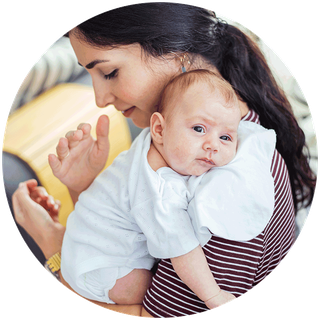- Expressing breast milk
- Expressing by hand
- Expressing with a pump
- Feeding advice
- Storing breast milk
- Hints, tips and more help
Feeding advice
Babies will feel more secure if most feeds are given by their parents or main caregiver, especially in the early weeks, as this will really help you bond with each other.
Tips on bottle feeding
Here are some tips on bottle feeding your baby:
- Feed your baby when they show signs of being hungry: look out for cues (moving head and mouth around, sucking on fingers). Crying is the last sign of wanting to feed, so try and feed your baby before they cry.
- Hold your baby close in a semi-upright position so you can see their face and reassure them by looking into their eyes and talking to them during the feed. Begin by inviting baby to open their mouth: gently rub the teat against their top lip.
- Gently insert the teat into baby's mouth keeping the bottle in a horizontal position (just slightly tipped) to prevent milk from flowing too fast.
- Watch your baby and follow the cues for when they need a break; these signs will be different from one baby to the next. They may splay their fingers and toes, spill milk out of their mouth, stop sucking, turn their head away or push the bottle away. Gently remove the teat or bring the bottle downwards to cut off the flow of milk.
- Your baby will know how much milk they need. Forcing your baby to finish a feed will be distressing and can mean your baby is overfed.
- If the teat becomes flattened while you are feeding, pull gently on the corner of your baby's mouth to release the vacuum.
- Your baby may need short breaks during the feed and may need to burp sometimes. When your baby does not want any more feed, hold them upright and gently rub or pat their back to bring up any wind. This may be a very small amount, as wind is not as big a problem as many people think.
- Never use a prop for the bottle or leave your baby alone with a bottle as there is a risk they might choke.
Did you know?
You should never bottle feed your baby while they're lying flat on their back, as this could cause choking.
Burping breaks
Your baby may need a few breaks during feeding to burp (especially important if your baby has reflux or colic).
Sit your baby on your lap facing away from you, or over your shoulder, and gently pat or rub their back. Have a look at our guide to burping your baby.
When your baby burps, they may bring up some milk – this is normal and nothing to worry about, just make sure you have a muslin or cloth handy!
If your baby brings up a lot of milk after feeds, or seems unsettled and cries a lot during or after feeds, talk to your health visitor or doctor. This may be related to colic, or reflux.


Breastfeeding Friend from Start for Life
The Breastfeeding Friend, a digital tool from Start for Life, has lots of useful information and expert advice to share with you – and because it's a digital tool, you can access it 24/7.
Help and support
For confidential breastfeeding information and support, call the National Breastfeeding Helpline on 0300 100 0212.
Lines are open 24 hours a day, every day of the year.